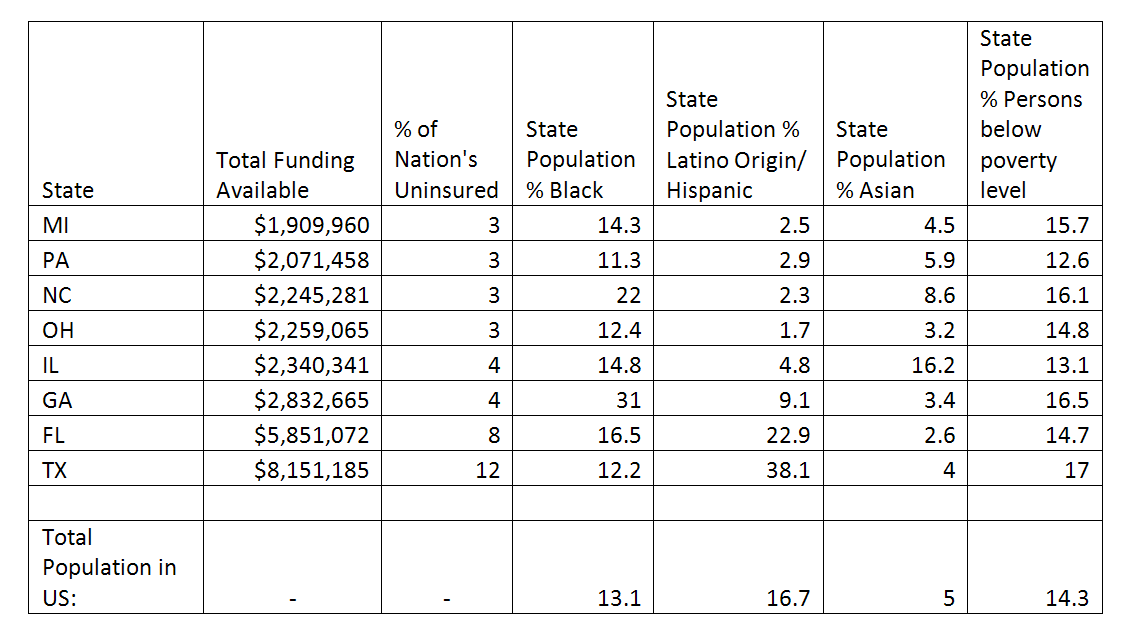HHS recently released the cooperative agreement funding opportunity for organizations interested in serving as Navigators in states with a Partnership or Federally Facilitated Exchange. Navigators, designed to assist individuals and families by identifying and explaining the insurance coverage options in the Exchange, can be social service organizations, consumer health advocates, community-based organizations, as well as a host of other entities that undergo specific training.
HHS requires at least one Navigator in each state to be a community and consumer-focused non-profit, opening up the possibility of advancing some of the key elements of the ACA that aim to reduce health disparities. Navigators will be on the ground in communities enrolling people in coverage and educating community members about their health insurance options. This role gives Navigators the ability to advance health equity as they are on the ground recognizing and responding to the economic and social barriers many face in accessing quality health care.
We’re heartened to see that the cooperative agreement proposal includes several elements that make health equity a clear priority. These include the requirements that those applying to serve as Navigators must be capable of:
- addressing the needs of underserved and vulnerable populations, such as rural populations and individuals with limited English proficiency
- conducting public education activities to raise awareness about Exchanges
- providing information and services in a fair, accurate, and impartial manner
- providing referrals to any consumer assistance or ombudsman program to address consumer grievances, complaints, or questions about their health plan, coverage, or a determination
- • providing information in a manner that is culturally and linguistically appropriate to diverse communities and accessible to individuals with disabilities
Additionally, HHS recently issued a proposed rule that would establish standards to provide culturally and linguistically appropriate services and help that is meaningfully accessible to persons with disabilities, for all Navigators serving consumers in Federally Facilitated and Partnership Exchanges.
While we know that enrollment will be an ongoing process, requiring a true "all hands on deck" approach, these guidelines are an encouraging start. Moreover, while $54 million is not enough to execute a comprehensive education, outreach, and enrollment strategy in the 34 states eligible to apply for the funding, it’s a good starting point. This funding provides a strong opportunity for state advocates to leverage federal dollars with local and regional funders committed to reducing health disparities.
The amounts available to each Partnership and Federally Facilitated Exchange state for the Navigator program can be found here, but it is worth noting that those states with higher numbers of uninsured people, and many states with higher total populations of low-income communities and people of color, have been allocated higher funding levels. While the minimum amount any state may receive from the funding is $600,000, those states with greater uninsured populations can receive more funding, helping ensure that those with greater systemic disadvantages have more support to enroll in health insurance. We checked out these breakdowns according to 2010 Census data and matched against Kaiser’s tracking of a state’s total uninsured.
Given that these proposals are due by June 1, now is the time for consumer health advocates and smaller community-based organizations to coordinate. Organizations that work with targeted groups are more trusted and better able to engage with particular constituencies, making this proposal an opportunity for collaboration and true impact. For those consumer health advocates looking to partner with other groups on the proposal, consider regional or even local organizations outside of the health world that already provide social services. For smaller community-based organizations, identify your region’s or state’s consumer health advocacy organization and plug into their efforts to assist in outreach, education, and enrollment. Even if you haven’t yet been involved, uninsured people in your community need your help now!
Finally, if you and your organization are interested in learning the basics of federal grants and federal grant writing, join The Office of Minority Health Resource Center (OMHRC) on April 25, 2013 for a Capacity Building Webinar, Technical Assistance: Foundations of Grant Writing. RSVP online to ensure you can join the webinar.

